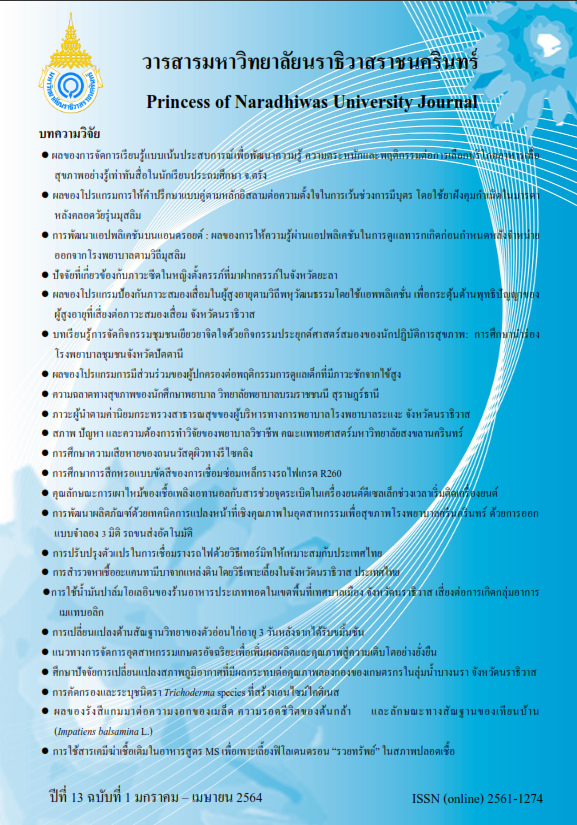Effects of Program for Couple Counseling Based on Islamic Principles on Intention Using Norplant for Birth Spacing among Muslim Teenage Postpartum Mothers
Keywords:
Adolescent mothers, Birth spacing, Norplant, Islamic women, couple counselingAbstract
The purpose of this quasi-experimental research was to study the effects of program for couple counseling based on Islamic principles on intention to use Norplant for birth spacing among Muslim teenage postpartum mothers who admitted to the postpartum units of a general hospital, Thailand. Twenty-five Muslim teenage postpartum mothers were selected by criterion and assigned into each of the experimental and control group. The experimental group provided the program for couple counseling based on Islamic principles, while the control group imported a routine care. The research instruments comprised of 2 parts: (1) questionnaires including the general information, the Birth Spacing of Muslim Teenage Postpartum Mothers and the Husband's Personal Information Questionnaire and (2) the Scale of intention to Use Implants for Birth Spacing. All instruments in this study were content validated by three experts. The reliability of the Scale of intention to Use Implants for Birth Spacing was examined using Cronbach’s alpha coefficient, yielding a value of .81. The data were analyzed using frequency, percentage, mean, standard deviation, chi-square, Likelihood ratio, Fisher’s exact test and independent t-test. The hypotheses were tested using independent t-test and paired t-test.
The results showed that: (1) subjects in the experimental group had significantly higher mean score of intention to use implants for birth spacing after intervention than before intervention (t = 23.53, p<.001); and (2) subjects in the experimental group had significantly higher mean score of intention to use implants for birth spacing after intervention than of subjects in the control group (t = 17.84, p<.001). The results showed that the program for couple counseling based on Islamic principles could help Muslim teenage postpartum mothers increase their intention to use implants for birth spacing. Therefore, the program should be utilized to promote a birth spacing, especially in Muslim context.
References
Aeamsamarng, P., Srisuriyawet, R., & Homsin, P. (2013). Risk factors of unintended repeat pregnancy among adolescents. Journal of Burapha University, 8(1), 56-67.
Ajzen, I. (1991). The theory of planned behavior. Organization Behavior and Human Decision Processes, 50, 179-211.
Bilateh, W., & Prachansri., S. (2014). Halalharam Medical. Retrieved (10 August 2017). from http://www.muslim4health.or.th/2014/index.php?op=.muslimhealthdetail&id=138#.WjFrhoWLTDd
Department of Health, Ministry of Public Health. (2011). Training course Couple counseling Operating men involved in maternal health care. Retrieved 12 July 2017, from http://rhold.anamai.moph. go.th/all _ file /brochure/Material%20for%20Provider/TOT%20 Manual_Couple%20Csg.pdf
Bureau of Reproductive Health, Department of Health, Ministry of Public Health. (2017). Thailand adolescent mother birth statistics, 2015. Nonthaburi: Agricultural Cooperative Publishing of Thailand.
Lewis, L.N., Dotherty, D.A., Hickey, M., & Skinner, S.H. (2010). Implanon as a Contraceptive Choice for Teenage Mother: Acceptability and Repeat Pregnancy. Contraception, 81, 421-426.
Polit, D.F., & Beck, C.T. (2012). Nursing research: Principles and methods (9th ed.). Philadelphia, PA: Lippincott.
Thinkhanom, W., & Chomnirat, W. (2012). Development of guidelines for the provision of service to adolescent pregnant women. The family participated in the antenatal clinic. Chai Buri District Health Service Network, Surat Thani Province. Journal of Nursing Science and Health, 35(2), 26-33.
Srivilai, K., (2011). Effect of Empowerment Program on Repeated Pregnancy Behavior in Postnatal Adolescent Mothers. Master's Thesis in Nursing Advanced Midwifery Faculty of Nursing Prince of Songkla University, Songkhla.
Somsap, Y., & Ingthawornwong, T. (2014). Alternative and Compound Health Show of Pregnant Women in Southern. Thailand Journal of Nursing Council, 29(2), 114-116.
Sananpanichkul, P., & Leaungsomnapa, Y. (2015). Adolescent Pregnancy: MaternalFactors EffectonFetal Outcomes. Journal Prapokklao Hosp Clin Med Educat Center, 32, 147-156.
Somsueneeto, A. (2011). Reproductive health in the view of Thai Muslims in the southern border. Academic Journal of Faculty of Humanities and Social Sciences, 8(1), 85-104.
Samuseneeto, A. (2016). Thai Muslim families in Pattani Province during the demographic transition. Academic Journal of Faculty of Humanities and Social Sciences, 12(1), 78-121.
Somsueneeto, A., Soonthornthada, K., & Khamsuwan, K. (2011). Reproductive health of Thai Muslims in Pattani: a difference that may become marginalized? Retrieved (25 March 2015). from www2.ipsr.mahidol.ac.th/ConferenceVIII/.../9-RH-ThaiMuslimsPattani-Anlaya.pdf. 186-201.
Wattanathamrong, V., Sirisophon, N., Kanyakha, P., Onsiri, S., Amitpaeo, C., Anak, G.,…, & Pholsorn, K. (2017). Repeated use of the contraceptive implant in adolescent women. Journal of the Royal Thai Army Nurses, 18 (special edition), 102-111.
World Health Organization. (2017). World health statistics 2017: Monitoring health for the SDGs, Sustainable Development Goals. Retrieved Desember 26, 2017, from http://www.who.int/ mediacentre/fact




